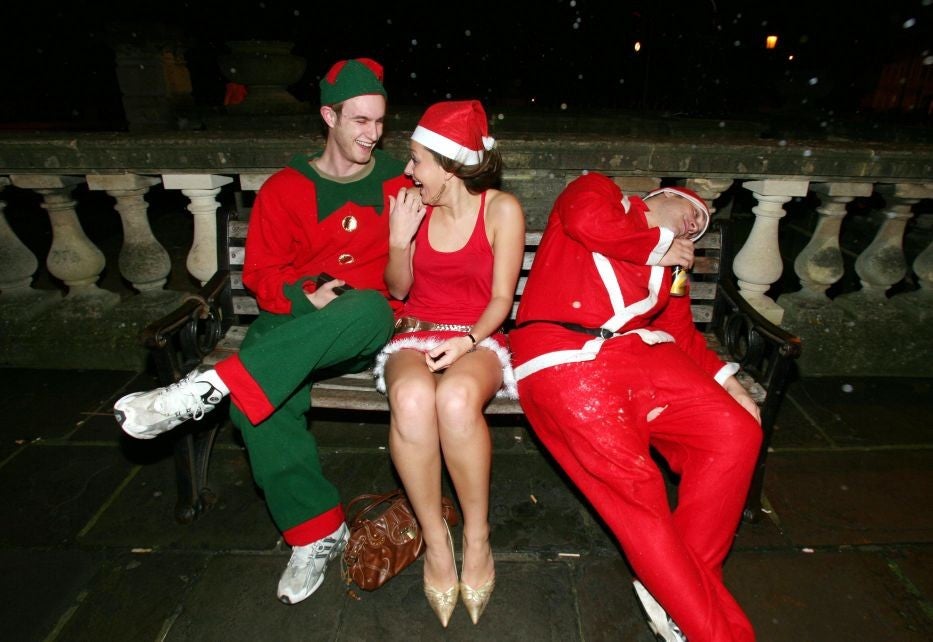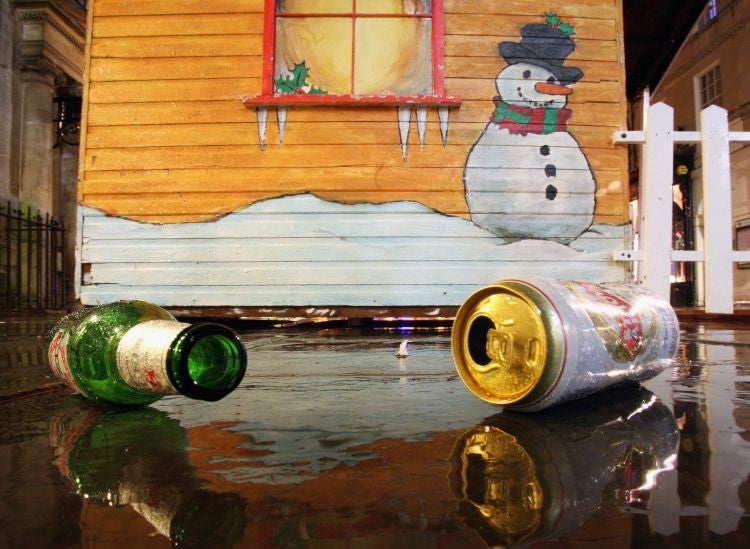Binge drinking over Christmas can be a big trigger for relapse
For most of us, the festive season is a time of excess drinking and partying. But for an abstinent recovering addict such as Michele Kirsch, it’s a duel with her demons – and a sobering reminder of Christmases past

Your support helps us to tell the story
From reproductive rights to climate change to Big Tech, The Independent is on the ground when the story is developing. Whether it's investigating the financials of Elon Musk's pro-Trump PAC or producing our latest documentary, 'The A Word', which shines a light on the American women fighting for reproductive rights, we know how important it is to parse out the facts from the messaging.
At such a critical moment in US history, we need reporters on the ground. Your donation allows us to keep sending journalists to speak to both sides of the story.
The Independent is trusted by Americans across the entire political spectrum. And unlike many other quality news outlets, we choose not to lock Americans out of our reporting and analysis with paywalls. We believe quality journalism should be available to everyone, paid for by those who can afford it.
Your support makes all the difference.It was a frosty evening in Bournemouth, near the end of 2011. I was in the Providence Projects rehab centre for tranquilliser and alcohol addiction and my friend and I were walking home from a Narcotics Anonymous meeting.
I didn’t understand NA and I didn’t like it. The long-recovered seem smug, and those like me, in early recovery, felt bewildered. To me, it was just more gobshite in a different setting. People who used to be on drugs talking about how much better it was to not be on drugs, but all the while inserting these little secret smiles that seemed to say, “Still, it WAS kind of fun.”
I went because they made me. You’re meant to go to 90 meetings in 90 days. But most of the people I was living with had been into Class A drugs, and my addiction seemed pathetic compared to theirs. Men said stuff about “putting a wrap of brown in their pound coin”, and I kept saying, “What does he mean? What’s ‘brown’? What’s a ‘pound coin’? I’m just a fucked-up housewife on Valium. You guys are too hardcore for me.” (“Brown” is heroin, and “pound coin” is rhyming slang for groin.)
“It’s some sort of strange cult,” I said to a rehab friend. “All that hugging. And everyone gets a prize. Even if you are sober or clean for just one day, you get a key ring and they congratulate you like you’ve won the Nobel Prize. I tell you it’s unnatural. What are they going to do at Christmas?” And then, with fresh horror, “What are WE going to do at Christmas?”
Still, I did my 90 in 90. And it was the walks home , to our temporary rehab flat, that really depressed me. One evening, we stopped in front of a house. There was a silver Christmas tree, with silver baubles, flashing fairy lights, some presents gathered round. The family were sitting on the sofa – a man, a woman, two children – passing a Christmas tin of Quality Street back and forth. The man was having a tin of lager; the woman, a glass of what looked like sherry. The flatscreen TV was showing EastEnders. We were transfixed. My friend turned to me and said, “Do you think we’ll ever be normal like them?” I welled up. He had never been in a family like that, but I had been married, with two children. I left them when my habit became unmanageable, before they could kick me out. “Do you mean watching telly, as a family, eating sweets?”
“No, ’course not! I mean, do you think we will be able to drink round Christmas, like normal people?”
For those in abstinence-based recovery, the answer is no, we can’t drink or take drugs ever, and the difference between those of us who can’t drink and those who do is exacerbated in the festive season. When everyone around you is slightly or very pissed, and you are stone cold sober, it’s as if you were beamed down from another planet. Everyone is talking rubbish, and truth be told, you want to talk rubbish, too. You want to get pissed so you can be on their planet. As such, the festive period is an extremely high-risk time for addicts to relapse. It’s not a jovial “falling off the wagon”. It’s a major fuck-up. One shot on an empty stomach brings a warmth and ease that slips down your gullet and hits the bloodstream and tricks your brain into thinking everything is fabulous and everyone is wonderful (and who wouldn’t want to feel like that?). And you tell yourself it is “just the one”. But it never is. It’s always a few more, until you lose count, and wake up the next day feeling sick, ashamed and remembering (if you can remember anything) that no, you really can’t drink like normal people.

I can’t remember exactly when I stopped drinking like a normal person. For a great chunk of my adult life I barely drank at all. I found the trajectory of people being convivial to obnoxious, sick and out of control – between being a bit tiddly to falling down drunk, from touching you a lot to show they like you, to grabbing your arse – a bit too rapid and unseemly for my liking. But somewhere around my early forties, old enough to know better, I started drinking like THOSE people. You know the ones. They are out in droves at this time of year.
All around me I see signs of Hogarthian excess in my hipster ’hood in London. The City boys and girls, the work-hard, party-harder start-up whizzkids are drinking themselves into a seasonal stupor. Stiletto-perched teetering girls stand splay-legged, like giraffes kneeling down for something, throwing up outside minicab offices while their least drunk friends hold their hair back. ’Tis the season to be jolly – jolly drunk, that is – and even those intent on having just the one, to be polite, have a few more, because they are cajoled by a chorus of partying pissheads who implore, “Relax, it’s nearly Christmas.”
None of my friends and family implores me to “relax” in this way anymore. I can’t drink. To me, relax means relapse. I don’t do “just the one”. I get hammered, or I don’t drink at all.
Having fallen spectacularly from grace in the late Noughties, when a series of good friends died, I stealthily acquired a filthy, protracted, prescription drug and booze habit. I did a runner on my family – by which I mean my husband and teenage kids – at the end of 2010 (and no, I don’t remember that Christmas at all) and then I spent the better – read: worse – part of a year in a squalid bedsit.
After various bad, “Trainspotting for Housewives” attempts to clean myself up, I approached the drug addiction charity Lifeline, which kindly sponsored a three-month stint in rehab, which I entered in October 2011.
I am not being melodramatic: it saved my life. Post-rehab, I was what AA calls a dry drunk: not drinking, but with no “programme” in place. I had no strategies to not drink, apart from remembering all the havoc and misery it caused to those I loved the most in the world: my estranged husband, my children, my friends and family. That first Christmas after rehab, December 2011, I wound up spending Christmas Day on the futon of a house I was cat-sitting at. Struck down with Norovirus, watching old Top of The Pops and Only Fools and Horses in between vomiting, I felt I was paying a suitable penance for a mum on the run. It was probably the easiest Christmas I spent not drinking. My body rejected everything. I was surrounded by the furniture of the sort of happy family life I used to inhabit: books, music, an abundance of nuts and satsumas, Christmas cards made out to four people. This last detail induced the greatest self-pity: if I were to get a Christmas card, it would be addressed just to me, after years of being one in four. The self-pity was totally unwarranted. Anything bad that had happened to me, I had brought on myself.
About a year later, still suspicious of regimented, all-free-time-consuming AA meetings, it struck me as a good idea to get the stupidest job in the word for a non-drinking alcoholic – washing glasses in a very noisy restaurant and bar, pouring the dregs of often nearly full cocktails downs the drain when every fibre of my being longed to pour them down my throat. I had already lost the love and respect of the family I made. I was living in a semi-assisted “dry house” where we were saliva- or piss-tested for drugs or alcohol. The staff were only slightly older than my own children.
The people I was hanging and working with did not know about my past, and I was working in the catering industry. In theory, this is notoriously and diproportionately rotten with problem drinkers and drug takers. But actually, I haven’t met one person in any occupation who hasn’t said, at one point, that working in their field – medicine, construction, the airlines, the media, law, entertainment, modelling, the City – means that there is a lot of drinking and drugging going on. It’s a strange form of one downmanship: we are bigger pissheads than you lot. And boy, can we party – particularly at Christmas and New Year.
When I was working in the restaurant, I had been clean and sober for a little over a year; I was pouring vast amounts of unfinished, luridly coloured cocktails down the sink. I thought: I can do this. My manager, unaware of my past – protracted use of tranquillisers, supplemented by large quantities of vodka – said there was a spare drink going at the end of service. It was a fruity, icy thing called a Hix Fix, but all I heard was the word fix. Yes, I could sure do with a fix. I drained it so quickly I didn’t taste a thing. Soon, I felt that familiar warmth and sense of ease and comfort that drinking on an empty stomach brings. It was my first slip since I’d left rehab, but it was fine, ’cos I was working in a shitty, high-pressure, low-skilled job – and hey, I deserved it. It was my first tumble, but certainly not my last. (Thankfully, it didn’t lead to a major relapse, but what we euphemistically call a “slip”.) I had a drink. It felt very good. And then I remembered an occasion a few years earlier: being passed out in the garden in front of my then-17-year-old daughter, on her birthday. That was HER job; it’s what 17-year-olds do, not middle-aged mums – at least, not in front of the kids. And it was that hideous, mortifying thought that saved me from a full-blown binge.
I am not alone in relapsing or thinking about relapsing at this time of year. According to the addiction charity Addaction, consumption of alcohol in Britain increases by 40 per cent in December. Fourteen per cent drink more than they intend to; and though there are no official figures on how many recovering addicts slip or relapse over the holiday period, anecdotal evidence suggests it’s a lot.
Recovering addicts who will be spending their first Christmas sober might choose to avoid parties, pubs and maybe even Christmas Day festivities – but alcohol, if only the sight of the stuff, is impossible to avoid. Canny supermarkets put all their on-sale booze in prominent displays, urging us to stock up for Christmas. The shops are lousy with drink, the pubs and restaurants are rammed with office-party goers. (There’s a tab behind the bar, so they really go for it.) And before it all gets ugly, with passing out and vomiting and those special tents they set up for the seasonally pissed – where well dressed men and women sit strapped into seats, clutching basins to be sick in – it all looks kind of fun.
For those of us who are sober, perhaps not yet trusting our own self-discipline, the options are few. Followers of the Twelve Step method of recovery – who go to AA meetings, or to other substance-misuse fellowships such as Cocaine Anonymous or Narcotics Anonymous – might suggest the vulnerable get themselves to a meeting. But sitting in a cold church hall, drinking instant coffee, munching custard creams and listening to tales of both despair and redemption – well, it’s not my idea of a fun Christmas. And to opt out of all parties and social gatherings also seems the opposite of fun – and in my case, a big trigger for relapse. (If I am home alone, I can drink, and no one can hear me gently pass out.) But that’s not an option, either. I am a terribly clumsy relapser. Mild concussion, second degree burns, severed fingertips – I’ve done the lot, touching the stuff I said I would never touch again.
The three main triggers for relapse are: 1) anger and frustration; 2) temptation; and 3) social pressure. Well, hello? It’s Christmas. Who doesn’t feel these things – stuffed, sitting about a room with family you may not get on with and watching shite on telly? You go to the sales afterwards, and it’s all half-price booze, fairy lights and Slade on a tape loop.
There is also the pressure, particularly at New Year, to have fun. If, for most of your grown-up life, the main way to have fun has been to have so much that you couldn’t even remember it the next day, you have to relearn how to have fun without a drip feed of Russian Standard. What the hell did we do before we got drunk?
This is not a problem exclusive to alcoholics – because even normal people don’t drink like normal people during the festive season. (How many people who have overdone it the night before, for example, wake up on New Year’s Day feeling like death?) And in this case, those alcoholics with lots of “clean time” under their belts have the upper hand; they will probably wake up feeling well. So if you are questioning how much you are drinking during the “get out of jail free” time – if you are feeling remorseful and guilty over something you did or texted or shagged during your allowed, nay encouraged, bingeing time – it could be useful to think like an addict in recovery.

Advice for the abstinent
Patrick Wildman, a psychotherapist who specialises in the field of addiction, has the following tips for recovering addicts and seasonal bingers:
1) Being in recovery does not mean that you have to become a recluse and live a life where the only conversations are about recovery. Put boundaries in place which let you know when it’s time to leave a party.
2) Be open about your recovery. But also, if it does not feel comfortable yet to talk about it, know that it is okay to say no to a drink without an explanation. Remember that there are people who are not officially in recovery who choose not to drink.
3) While avoiding alcohol in shops at Christmas is nearly impossible, you can stay away from the sections if the temptation is too great. If possible, go to shops with a friend. Don’t put yourself in high-risk situations.
Brent Clark, an addiction counsellor who works with recovering addicts at the Spitalfields Crypt Trust (SCT), a charity that has been helping those facing addiction and housing problems for over 50 years in East London, feels the Hazelden Model for relapse prevention is a good one (Hazelden being one of the top Rehab centres in the US). The top tips for avoiding holiday relapse include:
1) Reconsider family gatherings. In early recovery it might be better to opt out if the focus is on drinking. Make sure you have an exit strategy so you can leave when you choose.
2) Return the holidays to a spiritual base. Drink creates false intimacy. Remind yourself of the spiritual basis of this holiday. The biggest present you can give to your loved ones is not something you can buy in a shop, but sobriety.
3) Throw your own alcohol-free party: create a new tradition which will create a foundation for future memories.
4) Don’t get complacent. Mid- to late-January is a very high-risk time for relapse. If you’ve survived Christmas and New Year without drinking, you may think you are high and dry and safe. This is the time to seek support, through fellowship meetings or counselling.
Meanwhile, Clark – who, via the SCT, is planning a series of alcohol-free fun events for those seeking to maintain sobriety but not miss out on the festive spirit – feels it’s important to not get too bogged down in recovery-based activities such as meetings, or only in fellowship-led events.
“We don’t get clean and sober to be miserable. It’s important to have fun and remember what fun is without drinking. Last year, we went to a panto and it was so wonderful, seeing rows of sober and happy people laughing and having fun. Same again this year.
Join our commenting forum
Join thought-provoking conversations, follow other Independent readers and see their replies
0Comments